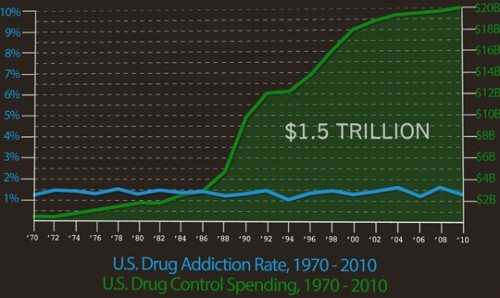The prohibitionists know that the con game they have to sell is a pig in a poke that that the public has seen through, which is why they keep trying to put lipstick on it.
You have Kerlikowske, for example, constantly touting the notion that there is no drug war, and that the ONDCP is moving away from the extremes to a “third way” – a balanced approach including law enforcement. Of course, what all that gobbledegook means is that we have a drug war with some extra money for forced rehab.
It’s also a problem for the nation’s only full-time prohibition-spinner Kevin Sabet, as demonstrated in this debate with Ethan Nadelmann at Reason Marijuana and States’ Rights: A Reason Debate. Drug Policy Alliance’s Ethan Nadelmann and Drug Policy Institute’s Kevin Sabet debate state cannabis initiatives.
Kevin had to know that the Reason crowd wouldn’t be too thrilled with prohibition, so he downplayed the effects of it. Ethan countered:
It’s not true – although I wish it were – that “most places punish the use of small amounts of marijuana similarly to a speeding ticket.” Few people are handcuffed or taken to a police station or incarcerated in a jail for speeding tickets, but all those indignities routinely are applied to people arrested for possession of small amounts of marijuana. Government employees won’t lose their jobs for a speeding ticket but they may very well for a marijuana possession arrest. Punishment can be even more severe if the person arrested is among the roughly five million Americans on parole or probation, often for very minor offenses. Millions of Americans have suffered much worse than the equivalent of a speeding ticket in recent years for nothing more than being caught with a little marijuana.
Now Kevin has often tried to suggest that we shouldn’t treat mere possessors of marijuana so harshly and here he doubles down with this rather bizarre response.
Ethan’s points would make good sense only if our choices were so stark. Besides full blown prohibition-enforcement for marijuana on the one hand, and legalization on the other, there are plenty of things we can do to get rid of the worst parts of our current laws (the things Ethan mentions —job loss, being cuffed, etc.). But that is not a good reason for legalization. That’s a compelling reason for some kind of specific reform. Given the risk we would take by legalizing marijuana — including the risks of increased use, accidents, and health and social costs [pdf] — it seems reckless and uncaring to go to such extremes in order to fix parts of the law that we can all agree are especially egregious. Ethan, would you abandon your legalization efforts if we got rid of the indignities you mention and yet kept marijuana illegal?
What would be the point? If you get rid of all the things that make enforcement of possession laws egregious, then you’re essentially creating a semi-legal product that can only be distributed by criminals. Why not regulate and control the distribution?
This is one of the big lies of the prohibition-spinners. They don’t want to reform prohibition. They like it just fine. They’ll tell you that they don’t want to lock up the small-time user, but they don’t discuss how that small-time user gets supplied.
There is no such thing as a kind and gentle prohibition. It’s harsh and ugly and wreaks a tremendous amount of havoc. And we can’t solve those problems unless we deal with drug use and abuse within a non-prohibition model.
…..
The comments at the debate are quite entertaining. This one from Zeb was my favorite (I’ve long hated the “lost productivity” argument).
“alcohol costs society over $200 billion in lost productivity”
Fuck Off, asshole. My potential productivity does not belong to society.


